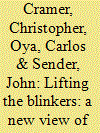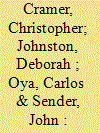| Srl | Item |
| 1 |
ID:
084471


|
|
|
|
|
| Publication |
2008.
|
| Summary/Abstract |
This paper presents some results from the largest rural labour market survey yet conducted in Mozambique. Evidence from three provinces shows that labour markets have a significant impact on the lives of a large number of poor people, and that employers exercise considerable discretion in setting wages and conditions of casual, seasonal and permanent wage employment. The evidence presented comes from a combination of a quantitative survey based on purposive sampling with other techniques, including interviews with large farmers. The findings contrast with ideas that rural labour markets are of limited relevance to poverty reduction policy formulation in Africa, and the paper concludes with methodological, analytical and policy recommendations.
|
|
|
|
|
|
|
|
|
|
|
|
|
|
|
|
| 2 |
ID:
145188


|
|
|
|
|
| Summary/Abstract |
Drawing on examples from rural Ethiopia and Uganda, this research note highlights some of the difficulties experienced in fieldwork. These difficulties do not justify the reluctance of increasingly risk-averse universities and funders to support independent fieldwork in Africa, but they do show that the rationale for research and the features of its design can provoke animosity and tensions. They also show that our own failure on occasion to appreciate local political dynamics made the situation more difficult. Challenges and threats came not only from local political forces but also from multinational companies and Fairtrade organizations uncomfortable with our findings and with fully independent research. The research note argues that the details of our experience have a practical value for other researchers, and that at least some of them should be treated as substantive forms of evidence and insight, rather than simply as threats or failures. We conclude that some crude best-practice norms and pressures on academics to form partnerships to conduct policy-relevant work may undermine the potential for truly independent and intensive field research. However, crises should not necessarily be seen as an unwelcome interruption to smooth processes of research; they can illuminate the context and power relations that the research is trying to understand.
|
|
|
|
|
|
|
|
|
|
|
|
|
|
|
|